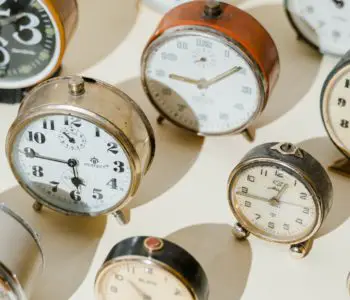When describing a sequence of events, time transition words will help you order things chronologically. Without these time order words it can be difficult for your reader or listener to logically follow what you’re saying. They also help make your English more interesting!
Transition words, also known as discourse markers, are expressions we use in everyday speech and writing, as well as in more formal contexts like essays, articles, papers and presentations.
Whatever the situation, these sequencing transition words are essential for talking about the order in which things happened (or will happen).

Time transition words for order and sequence
We’re going to cover more than 100 time order transition words here! They are grouped logically according to which part of a sequence or what point in time they describe. We have included example sentences to show how they can be used, too.
Once you have found what you need here, you might enjoy some idioms about time as well.
Transition words to begin a sequence
It makes sense to begin with some transition words for the first event in a sequence. Some of these can also be used to commence an argument, discussion, or story.
- To begin with
- To start
- First
- First of all
- At first
- Firstly
- Originally
- Initially
- Once
- In the beginning
- Let’s begin with
“First of all, I’d like to address the matter of the parking permits.”
“Let’s begin with a look at our quarterly sales report.”
“Initially they wanted to buy a brand new car, but then they decided to purchase second-hand.”
“Once there was a princess who lived in a castle.”
Another time transition word which sounds like it should belong in this list is ‘in the first place’. This phrase actually means ‘before’, and is generally used to talk about something that should have happened earlier, but didn’t.
“We should have listened to her in the first place!”
“Why didn’t you tell me this in the first place?”
Continuing a sequence of events
After you have introduced the first point in a sequence or argument, you can continue chronologically with one of these transition words:
- Then
- Next
- After (this/that)
- Afterward
- Afterwards
- Subsequently
- Following (this/that)
- Until
- Till
- Second, third, fourth, etc.
- Secondly, thirdly, fourthly, etc.
“They were happy playing in the garden until it began raining.”
“After this meeting, let’s continue the discussion over lunch.”
“I need to pop to the shops this morning. Afterwards, I’ll tidy the house.”
A note on numerical transition words
Although numerical transition words (first, second, third, fourth, etc.) can, in theory, be continued indefinitely, in reality we rarely go beyond ‘third’ when speaking or writing.
If you list more than three points out loud when speaking, it might make it hard for your listener to follow along. And in writing, it would be more common to use a numbered bullet list for 4+ items, rather than writing a sequence of events or points using ordinal numbers.
The question often arises as to whether you should use ‘first, second, third’ or ‘firstly, secondly, thirdly’. Some style guides recommend using ‘first’ to begin a list, regardless of how you continue. If you are writing in a formal context then you should check whether there is a particular rule for you to follow.
In general, however, either format is acceptable as long as you are consistent. For example, you shouldn’t combine ‘first, secondly, third’.
Time order words to end a sequence
When you reach the last point on a list, the last event in a sequence, or the end of a presentation, you can use one of these to show you are concluding:
- Finally
- In the end
- Last
- Lastly
- Last of all
- At last
- In conclusion
- In summary
- To wrap up
- At the end
These should only be used to end a list or sequence containing more than two points. It’s not strictly necessary to end with one of these transition words; you could end with ‘then’ or ‘after’, for example. However, these ending words will help make it clear that you have reached your final point.
“In the end, we decided to go on vacation to Costa Rica.”
“Last of all, I’d like to toast the happy couple.”
“To wrap up, let’s break out into small groups and share what we’ve learned today.”
Check out some more transition words for concluding here.
Examples of sequential transition words
Here are some examples of these start, middle and end transition words for chronological order, in situations where you may often need them.
To outline a presentation, speech or report
“Firstly, we’ll look at the results of the research conducted, then we’ll examine the impact this is likely to have on the community. Finally, I will present a list of suggested actions. At the end there will be a chance for you to ask questions.”
To go through a list of numbered points
“First, we’re going to visit the castle. Second, we’ll stop at a monastery. Third, we’ll have lunch at a local restaurant, and last of all we’ll spend a couple of hours at the beach.”
To give an account of something that’s happened
“I arrived in the office as usual, and first of all I switched on my computer. After that, I went to the kitchen to make myself a coffee. Next I checked the mail, and when I returned to my office I saw that the safe was open and all the money was gone.”
Do you think that’s all there is to know about time transition words? We’re only just getting started! Next, let’s look at some sequencing transition words to talk about different points in time.
Time order words: past, present, future
In the past (ending before now)
The following time transition words can be used to talk about something that began in the past and finished before the current time, or which ended/will end before the next thing in the series.
- Prior
- In the past
- Formerly
- Previously
- Earlier
- Before
“In the past he was living homeless, but now he has made a good life for himself.”
“Before rolling out the dough, be sure to dust the worktop with flour.”
“Prior to becoming a teacher, I worked in a bank.”
You may also want to use some idioms to talk about the past.
Until now
What about something that began in the past but is still applicable at the present time, or as the next thing in the series begins? Try one of these:
- Until now (past: until then)
- Up to this point (past: up to that point)
- Up to the present time
- So far
“So far I’m enjoying my job, but I have only been here for 2 weeks.”
“At age 36 he decided to travel the world. Until then, he had been working in a factory.”
Present time
You might want to emphasize that you are referring to the current moment in time using one of these time words:
- At the moment
- At this time
- At this point
- At this point in time
- At the present time
- At present
- Currently
“At this point in time I’ve decided to focus on my family rather than looking for work.”
“She said she isn’t hungry at the moment.”
Using any of these suggests that the situation may change soon and the current state is only temporary.
See some idioms about the present time, or learn some phrases to describe change.
In the future
Here are some phrases you can use to talk about something starting at the current time and extending into the future:
- From now on (past: from then on)
- From this point forward (past: from that point forward)
- From today (past: from that day)
- Henceforth
- Now that
- Going forward
- In future
“I had a bit of a health scare last month. From now on I’m going to exercise every day.”
“From that day forward, he decided to dedicate his life to helping others.”
“In future, we should be more careful about the clients we take on.”
And yes, there are idioms about the future too!
Concurrent events
What if you need to talk about two things happening at the same time? The following time order transition words show that one thing takes place at the same time as another:
- Concurrently
- At the same time
- Meanwhile
- In the meantime
- During
- While
“He fell asleep during the movie.”
“Please could you investigate the drop in traffic to our website? In the meantime, I’ll speak to our Sales team.”
“I don’t know how you can work while you’re listening to that music!”
How soon will it happen?
Next, we have some transition words and phrases, most of which are adverbial, to add a sense of timing to an action. Will it happen very soon or not for a while?
These are listed more or less in order from the soonest to the furthest away. However, many of them have a similar meaning so there is not a strict distinction between every one.
- Straightaway
- Immediately
- Instantly
- This instant (past: that instant)
- Forthwith
- Without delay
- Presently
- Shortly (a confusing adverb that doesn’t relate to distance)
- Quickly
- Soon
- After a while
- Later
- By the time
- In due time
- In due course
- In time
- Sometime
- Sooner or later
- Eventually
- At long last
“I’ll take care of that without delay.”
“They took a stroll through the woods and after a while came across a mysterious shack.”
“At long last we found the campsite, but it was already dark.”
See also: Confusing adverbs and A while vs awhile
Showing surprise at the timing of an occurrence
- Suddenly
- All of a sudden
- All at once
- Out of the blue
- No sooner … than …
- As soon as
“No sooner had he passed his driving test than he wrecked his car.”
“I had a phone call from an old school friend out of the blue.”
Time transition words to describe frequency
Finally, you might want to say how often something occurs. Again, these are listed roughly in order from most to least frequent.
- All the time
- Often
- Regularly
- Frequently
- Occasionally
- Sometimes
- Now and again
- Now and then
- From time to time
- Once in a while
- Hardly ever
- Rarely
- Never
- Not anymore
“I like to get my hair cut regularly.”
“I often eat out but I hardly ever cook a meal from scratch.”
“She visits her grandparents from time to time.”
“I don’t go out after 10pm anymore.”
You can learn about the difference between sometimes and sometime here, if you’re unsure. We also have an article about the difference between anymore and any more.
Note that ‘all the time’ is usually not taken literally to mean ‘constantly’. Instead, it means ‘very often’.
“I go past that shop all the time but I have never been inside.”
“My mum phones me all the time, it’s so annoying!”
And that’s all we have to say about time transition words! If you’d like to discover some more transition words to use in written or spoken English, check out these other articles:
Transition words for addition
Transition words for cause and effect
Transition words to compare and contrast
Transition words for similarities
Transition words for giving examples


